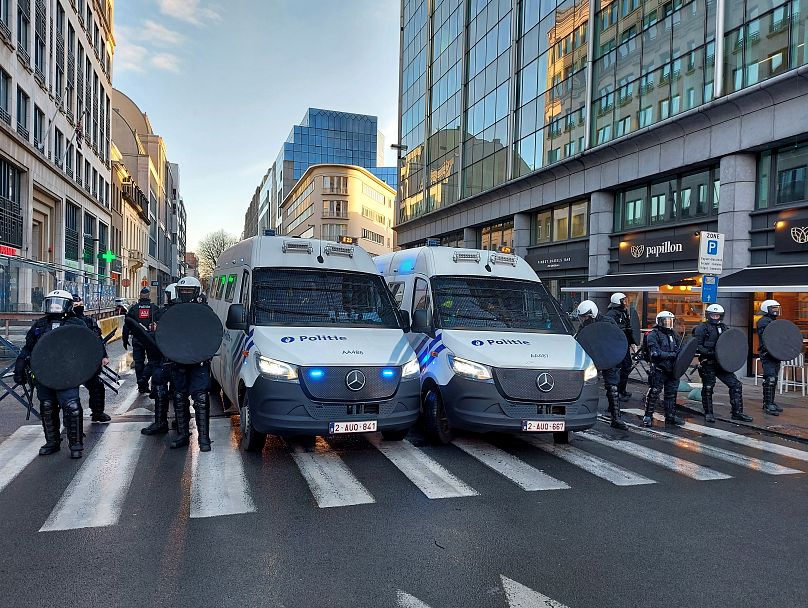A police operation prevented trucks and vans from entering Brussels and disrupting the city in protest against COVID restrictions and vaccine mandates.
An attempt by the self-proclaimed "freedom convoy" to disrupt Brussels, the EU's de-facto capital, failed on Monday as a coordinated police deployment put the brakes on the protest movement.
Belgian authorities had previously issued a ban on the Canada-inspired demonstration, fearing the sudden entrance of hundreds of trucks and vans could bring the capital to a halt.
The movement opposes anti-coronavirus restrictions and vaccination mandates, as well as soaring energy prices and the rising cost of living, and has already already reached Paris and the Netherlands.
In choosing Brussels, the city that hosts most EU institutions, as their next destination, the "convoi de la liberté" intended to make a splash similar to the headline-making chaos that recently took over Ottawa.
Over 1,300 vehicles gathered on Sunday in Lille, France, close to the Belgian border, to prepare for their journey towards Brussels.
But police moved decisively to thwart the operation: officers carried out checks at key entry points between Brussels and Flanders to identify and filter out possible disruptors. Those identified as agitators were re-directed to the site of the Brussels Expo, in the north of the city, where a "static demonstration" was allowed.
Meanwhile, a small group of protesters arrived on foot at Cinquantenaire Park, close to the main EU buildings, carrying national flags and sounding foghorns under the watchful eye of the Belgian police.
"I want things like the vaccination passports and all restrictions to be completely closed – finished," Igor Pose, a Siberia-born protestor who lives in Brussels, told Euronews.
“It’s not all about corona, it’s about all topics that are wrong right now," said Rudi Welsen, another participant who came from Germany and is highly critical of Chancellor Olaf Scholz.
After being held back by law enforcement, the group moved to Place Sainte-Catherine, a well-known meeting point in the city centre, where a larger crowd gathered and chanted "Liberté!" ("Freedom!").
Between 100 and 200 people joined the demonstration, according to local media. Some expressed satisfaction with the turnover while others admitted they were expecting higher numbers.
Although chaos and turmoil were avoided, there was a tense quietness all over Brussels throughout the day. Police cars filled the streets and barricades could be seen nearby the EU institutions. Access to the city reopened around 16:00 CET.
The increase in security and surveillance came four days after Belgian authorities issued a ban on the protest, arguing the participants did not file the necessary request.
In a joint statement released on Thursday, Belgian Interior Minister Annelies Verlinden, Brussels-Capital Region Minister-President Rudi Vervoort and Brussels City Mayor Philippe Close said they were mobilising federal, regional and local resources to prevent the convoy from blocking the capital and minimise disruption for ordinary residents and commuters.
"So far we have spotted 4-500 vehicles [...] cars, motorhomes, small vans. About thirty have been blocked and others have disbanded," Close told local media.
Authorities advised against travelling to Brussels unless absolutely necessary and preferably using a means of transport other than by car.
"This demonstration is not allowed. Our services are working to ensure that our roads are not blocked. If you have to be in Brussels on Monday, choose public transport," tweeted Vervoort.
Police and wired barricades were also deployed around the Schuman roundabout, which hosts the headquarters of the European Commission and the EU Council.
Due to its political symbolism, the Schuman roundabout is often the target of demonstrations, most of which unfold in a peaceful and authorised manner.
The area is scheduled to be cordoned off later this week, as EU and Africa leaders are set to meet in Brussels for a two-day EU-African Union summit.
Meanwhile, the Strasbourg prefecture also issued an order banning all "undeclared demonstrations" near the European Parliament.
"Several road convoys seem to have formed to reach Strasbourg," authorities said on Monday.
A ban on the anti-vaccine "freedom convoys" is due to remain in place until the parliament finished its plenary session on Thursday.












